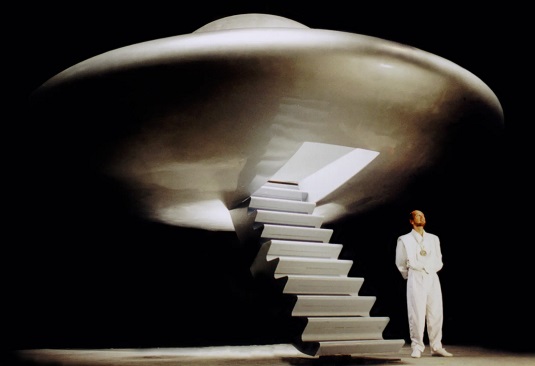
How does this all work? Young people found to have latent energies are recruited to their nearby embassy. They undergo training, get paired up with a designated "lover", and when they have sex they learn to project their consciousness across space. Humanity has come into contact with three alien races this way: a bird/tree analogue symbiont, sentient inflatables that float about a low-gravity moon, and more-or-less static crystalline entities rooted to a world bathed by an energetic sun. Communication is psychic so the humans, and presumably vice versa, occupy a volunteer's body so they can talk with their space siblings. Sounds far out. But is there more than meets the eye? Alien Embassy follows Lila, a young East African woman who has the talent. When she enters the embassy, she's told in no uncertain terms never to go through the doors with the red swastika on them. Whatever might happen next?
I'm not going to say more than that about the plot. This is the first Ian Watson I've read, and it was very good though some aspects of it were, let's say, of its time. His previous book was called Orgasmachine, to give you a flavour of where Watson's coming from. There are adolescent sexual encounters that, thankfully, aren't rendered in too much detail and would never make it into a mainstream publisher today. There's also the uncomfortable asides on breasts, but they're not as frequent nor as prurient as others one might mention. Thankfully, the rest of Alien Embassy rises above these awkward moments. The prose is literary, there is proper character development, and Watson is able to explain his esoteric melding of Eastern philosophy and Western science without intrusive and barely digestible info dumps. He sustains interest through two conceptual breakthroughs that completely upend the world he's built, highlighting a theme apparently common to his work - the manipulation of people and situations by elites.
Aside from being a well-written and entertaining novel, Alien Embassy could be thought of as a polemic against the arrogance of Enlightenment-centred thinking. Which, given how most of the main texts of French poststructuralism had appeared by the time this book did, certainly finds it swimming in a cultural current that hasn't got weaker in the 40-odd years since. The fantastical uses to which Tantric ritual and Tibetan mythology are put underscores how, despite their elision with mysticism in the West, they emerged as practical frames of reference for making sense of the world. And though exploiting the "mystery" and "exoticism" Eastern philosophy typically has for Western (British) readers, Watson makes the case that they are valid frames for interpreting the world. However, the fact the Bardo - the Space Communication Administration - that runs the embassies and is in charge of space flight might not be all that it seems could serve as a cautionary note to his more credulous readers; that they should beware anyone who touts Eastern philosophy as a cure all for the empty Western soul. As such, Watson is making a more nuanced point than some contemporary writers do about similar themes.
Alien Embassy is a stunning work of imagination, and is very much on the readable side of mind-bending genre fiction. Most of the uncomfortable sex stuff is toward the beginning . If you can get past that, an unsung banger of British SF awaits.
Image Credit
6 comments:
I loved Ian Watson's books. Sadly, my local bookshops never gave him much shelf space and his books seemed to go our of print much too quickly. I strongly recommend 'The Jonah Kit' and 'The Flies of Memory'. Wonderfully odd stuff.
I read The Embedding, The Jonah Kit, The Martian Inca, and the marvellous Miracle Visitors -- all brilliant novels by Ian Watson from the 1970s, which I read not long after they came out in paperback. You might particularly like Miracle Visitors, which deals with the UFO experience and is highly evocative of its bewildering nature, which renders it light years away from any 'nuts and bolts' alien spacecraft explanation.
Cheers for the recommendations!
I've got one of yours on the TBR pile Ken, but at this rate it'll probably be Christmas before I get round to it ...
I'm afraid I couldn't get into Alien Embassy, bit I'll have another look at it. Watson is generally good but lacks the gee-whiz slam-bang which, alas, I tend to be sucked into.
But I loved his short story "The Very Slow Time Machine". Techno-Lovecraft.
Oh, wow, Ken McLeod! All rise, please!
Just finished it. He can write but what is his obsession with breasts? I liked Lila as a narrator and it was interesting that he created a black character in a book of that age. Struggled a bit with the higher consciousness but then perhaps you should doubt that it had any reality.
Post a Comment